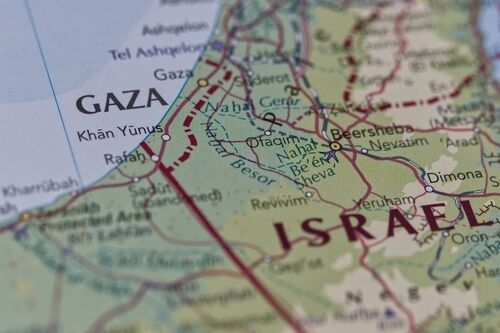Has Israel gone too far in Gaza?

Warning: this article is about a very contentious and sensitive issue and includes descriptions of harrowing suffering. The views in this article represent the views of its author.
The war in Gaza has now continued for 19 long months. Although a fragile peace was agreed upon on 17 January 2025, it lasted only a few months.
Since March, the conflict has entered a new and escalated phase. Israel has intensified its military campaign in Gaza, and Prime Minister Netanyahu has been explicit about the intention to take full control of the territory.
From the very beginning of the conflict, the most difficult question to answer has been this: in terms of Israel’s response, how far is too far? Even if you accept that Israel had a right to defend itself, the scale of suffering in Gaza forces all of us to grapple with this question.
In doing so, I want to acknowledge how deeply sensitive and contentious this issue is. Christians take different views and you may not agree with me. For some of you, I might not go far enough, for others I might have gone too far. But whatever your view, I hope we can all recognise how tragic the unfolding situation in Gaza continues to be.
Only now, as the war has dragged on, does the sheer complexity of the mission become more apparent. Ending Hamas’ ability is all the more challenging because this is not a conventional army. They have built tunnels and an underground world to shield themselves from Israeli airstrikes. They are practiced and used to operating in the shadows, avoiding detection. They have shown themselves all too willing to use Palestinian civilians as human shields by setting up their bases in hospitals.
Ask any military expert, and they will tell you that street-to-street fighting — where you must clear one building at a time — is among the most difficult and costly forms of warfare. The truth is that for all Israel’s military prowess, Hamas has been weakened, yes, but its capacity to strike back has not been eliminated. So, the war goes on.
Civilian suffering and media misreporting
All the while, the civilian cost also increases. It is difficult to know exactly how many people have died because most of the statistics we have come from the Hamas-run government in Gaza. I am not sure I’m willing to accept their figures at face value. The mainstream media has also not helped. This week, a UN chief claimed on the BBC that 14,000 babies could die in Gaza within 48 hours without humanitarian aid. After asking the UN’s Office for the Coordination of Humanitarian Affairs for clarification, the BBC reported that the remarks were based on a report that warned that 14,100 severe cases of acute malnutrition were expected to occur between April 2025 and March 2026 among children aged between six months and five years.
Such carelessness is embarrassing for the BBC — albeit not especially surprising. It came just after they had to pull a documentary for being overly biased against Israel, and in the same week that one of their highest-paid stars, Gary Lineker, was dismissed for sharing an image associated with antisemitism.
Pain on both sides: Gaza and Israel
Notwithstanding the questionable statistics, no one can deny that there is an awful civilian cost in Gaza. People are dying — not just paid-up Hamas members but Palestinians who, a year and a half ago, were simply living their lives. Even if some civilians are Hamas supporters, that does not mean we should not mourn over their loss, just as we continue to share in the grief of Israel.
People in Gaza are suffering from increased kidney problems because they have been forced to drink unhealthy water for lack of a clean alternative. There is severe hunger and threat from other illnesses. Some have witnessed their children killed in front of them. If you are a parent or grandparent reading this, can you imagine the horror, pain and heart-wrenching awfulness of watching this happen? There has also been massive displacement of people who have lost their homes. It is, by any reckoning, a humanitarian crisis and it is getting worse.
Israel is also quick to point out that Hamas operates from hospitals, fires rockets from UN schools, and raids humanitarian aid for their own profit. We must also think of the families in Israel who are still waiting to find out if their loved ones, cruelly taken as hostages, are alive and if they will ever see them again. I think too of the families of those who lost their lives on 7 October.
The rise of antisemitism
More broadly, I think it is very difficult for us to understand what life is like if you are an Israeli and if you live in Israel. Even in times of relative peace, you live knowing that on every side there are enemies who do not believe you have a right to exist. You belong to a people who throughout history have experienced multiple attacks and genocide during the horrors of the holocaust.
Threats to Jewish people reach far beyond Israel as well. Only a few days ago, Yaron Lischinsky and Sarah Lynn Milgrim, two Israeli embassy staff in Washington DC, were shot dead outside a Jewish museum in the city. Police say that man who killed them shouted ‘free, free Palestine’ when he was arrested. Yaron was due to propose to Sarah. He never even got the chance.
We have also witnessed the rise of antisemitism here in the UK. Following the conflict, the number of recorded incidents increased massively. There was the ugly sight of people marching across the streets of London changing antisemitic slogans while the Metropolitan Police failed to intervene.
When powerful influencers and celebrities like Gary Lineker then share pictures that are associated with antisemitism, you can understand why Jewish people both here and in Israel develop something of a siege mentality. Mr Lineker is entitled to his views on the conflict. But it is worth noting that he has said nothing about the hostages and has never called for their release. Such a one-sided, blinkered approach to this hugely complex conflict serves no-one.
The search for wisdom and Just War theory
As Christians, I think we of all people should recognise the complexities and should be the first to grapple with and agonise over what is going on. Above all, we should avoid simplistic statements about the conflict. It would be far easier if we could all take a black and white view of what is going on. And some things are clear: Hamas are terrorists. Israel is a nation state with the right to exist and defend its people. Palestinians also deserve recognition and safety. However, the solution to this conflict – which arises out of many, many years of conflict is going to be extremely difficult. And there is wrong on both sides.
Being honest and open about the challenges and moral and ethical perplexities of the conflict is never to be equated with being ‘pro-Palestinian’ or ‘pro-Israeli’. Asking questions of both sides is not a weakness but a sign of spiritual wisdom and maturity. We can also be profoundly thankful that God in His word gives us some key principles that help us navigate the question we began with which is: how far is too far when it comes to the retaliatory war Israel is fighting?
The ‘Just War Theory’ was devised centuries ago at the time of the Roman Empire. Theologians were grappling with the rights and wrongs of the Empire’s reaction to attacks on its borders by other groups and nations. Great thinkers like Augustine and Thomas Aquinas combed the scriptures for relevant principles and the result was a series of tests. Is there just cause? Just authority? Is it a last resort? Does it have just intention? is it winnable? Do both sides know the terms for peace? Is the cost proportional? And are the means of waging war just?
When the war started, I believed Israel’s response was consistent with just war theory. But the longer the conflict has gone on and the greater the scale of human suffering, I now am beginning to question whether the escalated response we have seen from Israel in recent months can be justified? I am not an expert and I have not reached a firm conclusion. In fact, I am wary of those who seem so sure and certain about what they think on this issue, on both sides. It seems to me that there are deep complexities here and it is not cowardly to say so.
I would urge readers wanting to grapple with this conflict to consider just war theory because I think it will help you come to your own view on the conflict. Christians can, in good conscience, disagree on this question. Whilst thinking about these things, we must pray for wisdom, and be careful when we speak about the war in the settings we find ourselves in - on social media, in our workplaces, and in our churches - knowing that people on both sides may be listening, and may be experiencing deep pain as a result of what’s going on.
Praying for true peace
Above all, we should pray for peace: not only that the war would end, and hostilities die down, but for true reconciliation and healing between the two peoples involved: Jews and Arabs. The Hebrew word ‘Shalom’ — ‘Salam’ in Arabic — communicates what the Bible considers true peace. It means completeness, soundness, and welfare in all of life. Having true peace within ourselves and with other people depends on us first knowing peace with God. Let’s pray for a pouring out of God’s Spirit in the Middle East, which will result in heart change, and life change, leading to culture change in the long term.
Those who know peace with God through Christ have the ultimate assurance of a new world to come that will never see war, death, mourning, or pain of any kind. The curse of this earth will be removed. Final justice will be administered. And as Micah 4:3-4 says, instruments of war will be turned into tools of blessing for the world.






